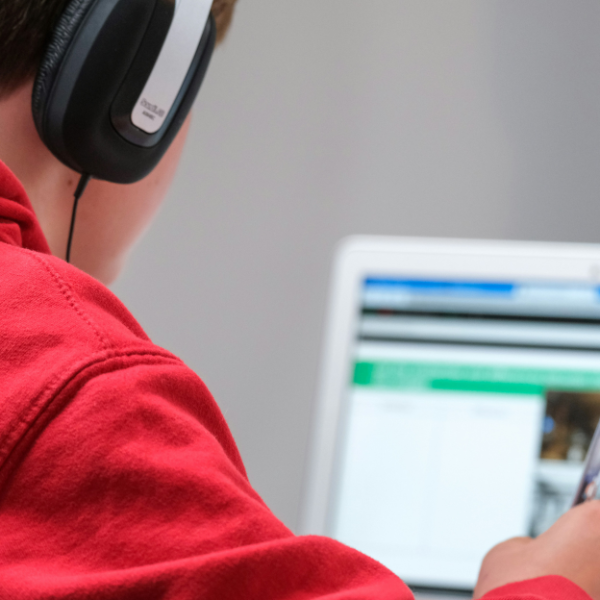In American schools, digital devices have seamlessly integrated into daily academic routines, with e-learning tools like VR field trips, remote class and more. In fact, Enterprise Apps Today states that over 70% of students in the U.S. still partake in some form of online learning. However, while this tech has its benefits, it does increase student screen time. This has understandably raised concerns about eye health and its long-term effects on children's vision. Parents are actively seeking solutions to minimize unnecessary screen time and promote healthier screen habits.
For example, instead of giving kids smartphones, parents are opting for alternatives like the TickTalk 5. This smartwatch combines voice and video calling and more to stay safely connected with your child, without the dangers of a cell phone.
Fortunately, the solutions for balancing online learning and healthy screen practices don't end there. Here are a few more tips that parents can teach their children to foster healthier device use while prioritizing children's eye health and overall well-being:
Taking frequent screen breaks
Encouraging children to take regular breaks from screens is crucial in preventing eye strain and fatigue. Device use requires near work, which can cause eye muscles to get tired. As a result, children may experience headaches and concentration difficulties. The American Optometric Association (AOA) recommends the 20-20-20 rule to give the eyes a break. Children just have to look away from their screens every 20 minutes to focus on an object 20 feet away for 20 seconds. Additionally, longer 10-minute breaks away from screens should be implemented every hour. During this time, have your kids stretch and walk around to reduce tension in the eyes and muscles. Parents can set up a timer to make these habits easier to follow. You can even use the TickTalk to remind your children when it's time for an eye break.
Wearing blue light glasses
Exposure to blue light emitted from screens can disrupt sleep patterns and contribute to digital eye strain. More specifically, the Sleep Foundation states that blue light suppresses the production of melatonin, a hormone that promotes feelings of sleepiness. Lack of sleep can lead to symptoms of insomnia, an inability to stay asleep, and difficulty focusing the next day. To minimize the impact of blue light, parents should encourage children to wear blue light filtering glasses. Reputable online eyewear retailers offer a selection of glasses frames that can be fitted with blue light lenses, with or without prescriptions. For kids, trusted brands like Oakley and Ray-Ban even have frames that are designed to be lightweight yet durable. When outfitted with specialty blue light lenses, these glasses can reduce exposure to blue-violet light from the sun, digital devices, and artificial light, even without vision correction.
Encouraging outdoor play
Balancing screen time with outdoor activities is essential for maintaining optimal eye health and well-being. Spending time outdoors exposes children to natural light, which studies show can help regulate their circadian rhythm. Moreover, outdoor play encourages children to engage in distance vision activities, such as looking at faraway objects. This can help reduce the likelihood of your child developing myopia, as well as minimize eye strain associated with prolonged near work. One study found that 40 minutes of outdoor time per school day can prevent the onset of myopia in children. Thus, parents can schedule outdoor playtime as part of their children's daily routine to support healthy visual development and physical activity. As some kids may feel more encouraged with playmates, you can refer to local support groups on platforms like Facebook for like-minded parents with similar-aged children.
Minimizing screen use outside of online learning
Limiting recreational screen time outside of educational activities is vital in preventing digital eye strain and promoting a balanced lifestyle. Setting clear boundaries and establishing screen-free zones in the home can help decrease excessive screen exposure and encourage alternative forms of entertainment, such as reading, arts and crafts, or board games. To stay connected with your children without a smartphone, consider our TickTalk smartwatch equipped with enhanced safety features, advanced location tracking, and secure communication options. With this device, families can stay connected with voice and video calling, messaging, and even photo sharing.
In the era of virtual learning, maintaining eye-friendly screen habits is essential for supporting children's overall well-being. With proactive measures and conscious screen management, children can thrive academically while safeguarding their visual health for the future.
Article written by Rosy Johns



Share:
TickTalk Wireless Plans: 2024 Tax Updates
Happy Mother's Day